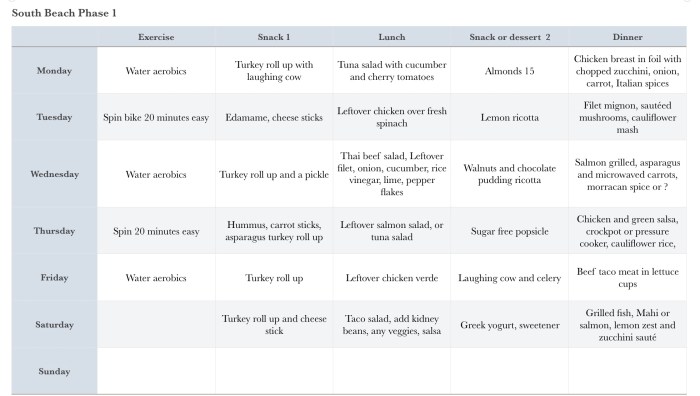South Beach Diet Author Arthur Agatston’s creation revolutionized weight loss. His cardiologist background uniquely shaped the diet’s focus on heart health and sustainable weight management, diverging from restrictive fad diets. This isn’t just a diet; it’s a lifestyle change built on scientific principles and a phased approach designed for long-term success. We’ll delve into Agatston’s life, the diet’s core tenets, scientific backing, criticisms, and lasting impact.
This exploration will uncover the man behind the diet, the science supporting its claims, and the controversies that surround it. We’ll examine the three phases of the South Beach Diet, comparing it to other popular plans and analyzing its effectiveness based on research. We’ll also discuss its legacy and influence on the weight-loss landscape.
Criticisms and Controversies Surrounding the Diet: South Beach Diet Author

The South Beach Diet, while popular, hasn’t escaped criticism. Like any weight-loss plan, it has its detractors, raising questions about its long-term efficacy and potential health implications. Understanding these concerns is crucial for making an informed decision about whether this diet aligns with your individual needs and health goals.The South Beach Diet’s emphasis on restricting certain food groups, particularly carbohydrates initially, has been a major point of contention.
Critics argue that this restrictive approach can lead to nutrient deficiencies if not carefully managed and may promote unhealthy relationships with food, potentially leading to binge eating or disordered eating patterns. Furthermore, the long-term sustainability of the diet’s more restrictive phases has been questioned, with concerns that reverting to less restrictive phases could lead to weight regain.
Concerns Regarding Nutrient Deficiencies
The initial phases of the South Beach Diet significantly limit carbohydrate intake. This restriction, while potentially effective for short-term weight loss, can lead to deficiencies in essential vitamins, minerals, and fiber if not carefully planned. Individuals following the diet need to ensure they’re consuming a wide variety of nutrient-rich foods from other food groups to compensate for the carbohydrate restriction.
A lack of proper planning could result in fatigue, digestive issues, and other health problems. For example, eliminating whole grains entirely could lead to a deficiency in B vitamins and fiber, crucial for energy production and digestive health.
Sustainability and Long-Term Weight Management
A common criticism of the South Beach Diet centers on its sustainability. While the diet may produce initial weight loss, the long-term success hinges on maintaining the lifestyle changes adopted during the diet’s later phases. Many individuals find it challenging to adhere to the diet’s guidelines indefinitely, leading to weight regain once they revert to previous eating habits.
The transition from the restrictive initial phases to the more flexible later phases requires careful planning and commitment to prevent weight fluctuations. This is where professional guidance, such as from a registered dietitian, can be invaluable.
Comparison with Established Health Organization Recommendations
The South Beach Diet’s approach differs from the recommendations of established health organizations like the American Heart Association and the National Institutes of Health. These organizations generally advocate for a balanced diet rich in fruits, vegetables, whole grains, and lean protein, emphasizing a gradual and sustainable approach to weight loss. While the South Beach Diet does eventually incorporate these food groups, its initial restrictive phase contrasts with the gradual and balanced approach recommended by these organizations.
The focus on limiting certain carbohydrate types, while potentially effective for short-term weight loss, may not align with the long-term health benefits emphasized by these organizations.
Frequently Asked Questions Regarding the South Beach Diet, South Beach Diet Author
The following points address some common questions surrounding the South Beach Diet. Understanding these points helps clarify potential concerns and aids in making informed decisions.
- Question: Is the South Beach Diet safe for everyone? Answer: While generally considered safe for healthy individuals, it’s crucial to consult a healthcare professional before starting the diet, especially if you have pre-existing health conditions like diabetes or heart disease. The initial restrictive phase may not be suitable for everyone.
- Question: Can I exercise while on the South Beach Diet? Answer: Yes, incorporating regular exercise is highly recommended to maximize weight loss and improve overall health. The diet’s emphasis on healthy fats and lean protein can support energy levels for physical activity.
- Question: How quickly will I lose weight on the South Beach Diet? Answer: Weight loss varies greatly depending on individual factors like metabolism and adherence to the diet’s guidelines. While initial weight loss may be rapid, the rate slows down as the body adjusts.
- Question: What are the potential side effects of the South Beach Diet? Answer: Potential side effects include headaches, fatigue, constipation, and nutrient deficiencies if the diet isn’t properly planned and monitored. These are often temporary and can be mitigated through careful planning and adequate hydration.
The South Beach Diet, born from the mind of cardiologist Arthur Agatston, stands as a testament to a scientifically-informed approach to weight loss. While not without its critics, its emphasis on heart health and sustainable lifestyle changes has resonated with millions. Understanding both its strengths and weaknesses, as explored here, empowers individuals to make informed decisions about their health journey.
Agatston’s legacy extends beyond a simple diet; it’s a contribution to a more holistic and sustainable approach to weight management.

